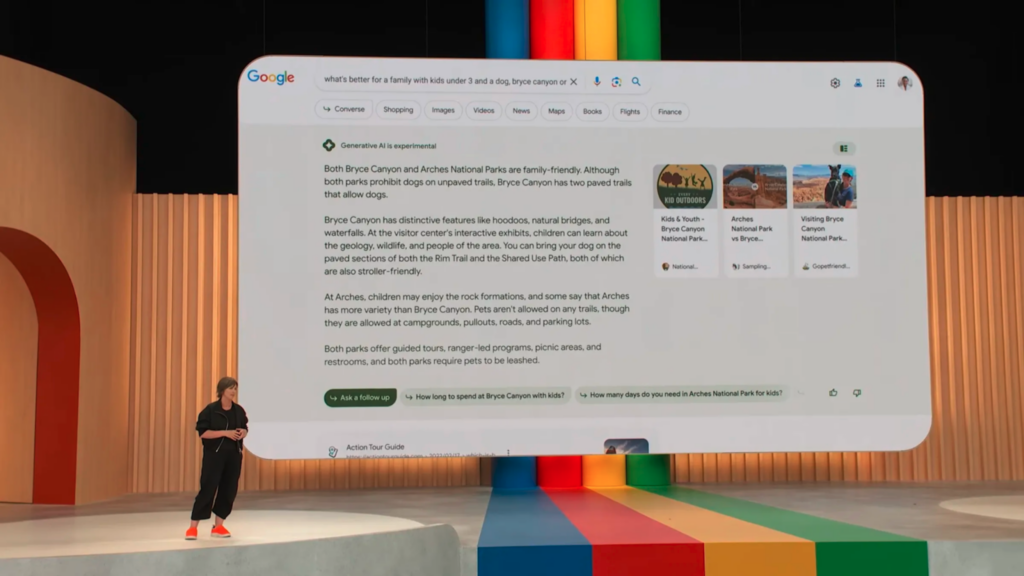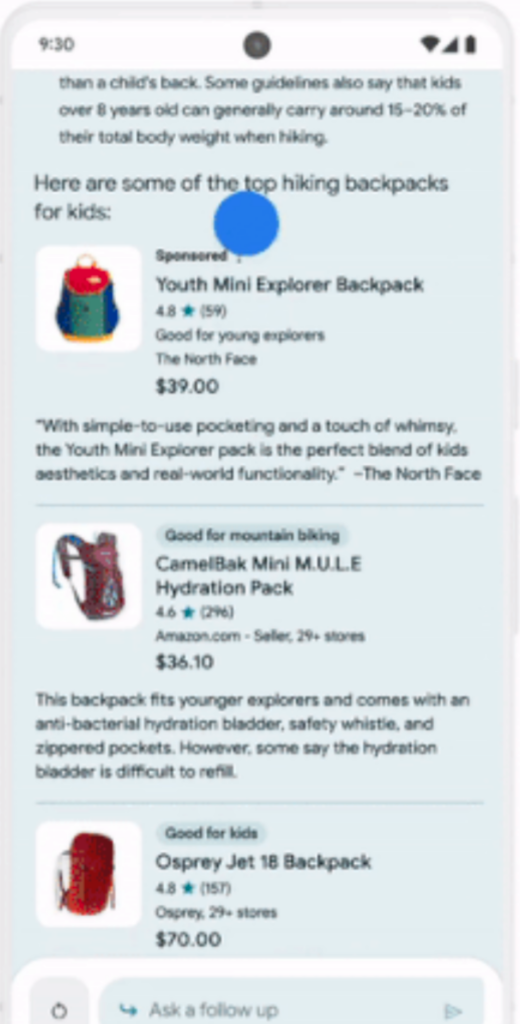In a world where Google’s search results page has only experienced small iterative changes over the last two decades, search marketers are bracing themselves for a revolutionary facelift that will shake up the way content is consumed
In a two-hour-long keynote speech and demonstration the ‘big G’ has given us given us a taste of how generative artificial intelligence (AI) will sit within search results – and on the whole, it’s mixed news for your organic search traffic.
What will Google results look like?

So, what do these AI-generated search results look like? Unlike Microsoft Bing, which went all-in with a ChatGPT-style messaging system, Google decided to amend the results page without bidding farewell to the format that has brought them success for many years. They call it an “AI-powered snapshot” that sits prominently at the top of the search results page.
The AI snapshot is essentially a few paragraphs of AI-generated content, complete with relevant links to back up the information. The snapshot even offers a list of potential follow-up questions to ‘continue the conversation’ should you need more information.
It appears that you can also switch to another view that breaks down the snapshot into individual sentences, each with its own link to the source material.
Is this good news for publishers?
This is good news for marketers as the original releases didn’t give any references to publishers. In our previous articles concerning Bard and Magi, the example graphics released by Google threatened to completely replace website results, causing uproar in the community. Since the AI relies on continuous publishing, it was imperative that Google responded by including website results.
The purpose of SGE isn’t just to swiftly answer the questions and to send you on your wayl. According to Google, their primary mission remains firmly focused on directing attention to web content. They’re determined to keep sending valuable traffic to websites far and wide as they venture into the realm of generative AI. Marketers who adapt and optimise their content to be part of this new ecosystem will benefit the most.
However, the traditional blue links are being pushed way down the page, meaning a loss of real estate. There is likely to be a reduction in click-through rate for those ranking in top positions, but there is every chance of featuring in the top 3 reference links which will effectively become the new ‘1st position’ in Google.
With that said, the AI answers are unlikely to show for all search queries. The examples given during the keynote were very long tail keywords, those looking to compare products and other ‘research and question’’ type queries. This change is unlikely to affect transaction searches just yet!
Currently, the trial is limited to Chrome desktop and the Google App in the US. But Google will soon be accepting sign-ups to grant us early access to the Search generative experience (SGE).
What about search ads?
The obvious elephant in the room in search ads. Google ads are a multi-billion dollar revenue driver and it seems as though these changes will replace (or at least reduce) the real estate that ad results occupy.
However, In one of the released screenshots, you can spot e-bike ads right beneath the AI snapshot, labelled as “sponsored ” as is the case in current search results. It seems as though advertisers will still have ample opportunities to infiltrate the search journeys at key jump-off points.

The continued quest for AI search market share
Why is Google doing this? They’re in a fierce battle to maintain their search engine supremacy against opportunistic AI challengers. With rival chatbot ChatGPT rising in prominence, Google had no choice but to respond, unveiling the proposed features at the Google I/O developer conference in San Francisco.
Google claims that their AI improvements will allow them to know us even better, which means could also mean a higher number of more targeted ads coming our way.
Staff at Google claims that AI will understand what we truly mean, rather than relying on the exact words we type. AI will crawl existing content and deliver a concise summary so whilst search phrases are likely to be longer and more specific, answers are seemingly getting shorter and more concise.
For Google, this AI-generated search experiment holds immense significance. With the technology behind ChatGPT continuing to improve, Google is under pressure to stay ahead of the game.
The world may keep googling, but the way we search may be changing forever.
Get in touch to find the perfect package for you